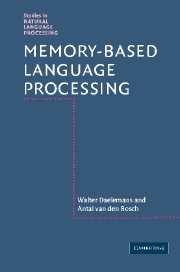Book contents
2 - Inspirations from linguistics and artificial intelligence
Published online by Cambridge University Press: 22 September 2009
Summary
Memory-Based Language Processing, MBLP, is based on the idea that learning and processing are two sides of the same coin. Learning is the storage of examples in memory, and processing is similarity-based reasoning with these stored examples. Although we have developed a specific operationalization of these ideas, they have been around for a long time. In this chapter we provide an overview of similar ideas in linguistics, psychology, and computer science, and end with a discussion of the crucial lesson learned from this literature, namely, that generalization from experience to new decisions is possible without the creation of abstract representations such as rules.
Inspirations from linguistics
While the rise of Chomskyan linguistics in the 1960s is considered a turning point in the development of linguistic theory, it is mostly before this time that we find explicit and sometimes adamant arguments for the use of memory and analogy that explain both the acquisition and the processing of linguistic knowledge in humans. We compress this into a brief review of thoughts and arguments voiced by the likes of Ferdinand de Saussure, Leonard Bloomfield, John Rupert Firth, Michael Halliday, Zellig Harris, and Royal Skousen, and we point to related ideas in psychology and cognitive linguistics.
Information
- Type
- Chapter
- Information
- Memory-Based Language Processing , pp. 15 - 25Publisher: Cambridge University PressPrint publication year: 2005
